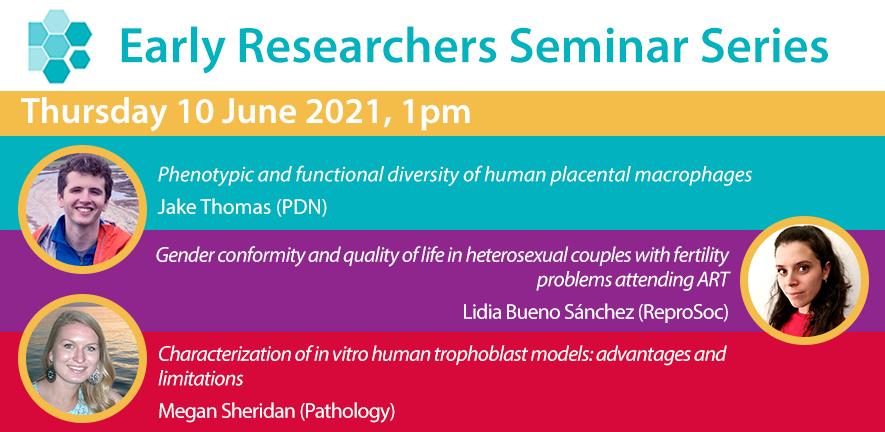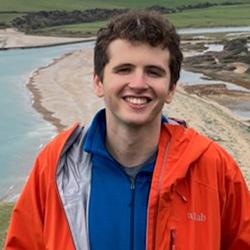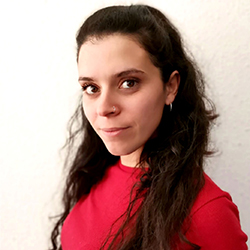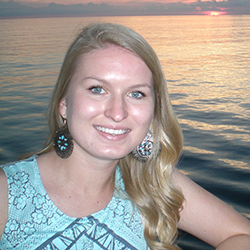
Thursday 10 June 2021, 1pm - 2pm
Phenotypic and functional diversity of human placental macrophages
Jake Thomas (PDN)
Gender conformity and quality of life in heterosexual couples with fertility problems attending ART
Lidia Bueno Sánchez (ReproSoc)
Characterization of in vitro human trophoblast models: advantages and limitations
Dr Megan Sheridan (Pathology)
Chair: Dr Francesca Gaccioli (Obstetrics & Gynaecology)
The Early Researchers Seminar Series (ERSS) is a platform for PhD Students and early career researchers (ECRs) at the University of Cambridge with research foci on reproduction to share and discuss their research with other academics from a range of disciplines also researching reproduction at the University. Seminars are held on Zoom on the second Thursday of every month, 1pm - 2pm. For more information, and for the full 2020 - 2021 programme, please see the main ERSS page.
Speakers and abstracts
Phenotypic and functional diversity of human placental macrophages
Jake Thomas (PDN)
Hofbauer cells (HBC) are a population of macrophages found in high abundance within the first trimester human placenta. HBC are predicted to have important roles in the growth and defence of the placenta during pregnancy, however the functional properties of these cells remain poorly described. We used flow cytometry with HLA allotype antibodies, microscopy and scRNAseq to resolve the immune compartment of the first trimester human placenta at high resolution for the first time. We determined HBC to be fetal macrophages derived from primitive haematopoiesis, with angiogenic capacity at the steady state. We also identified a novel population of placenta-associated maternal macrophages (PAMM) adherent to the surface of placental villi. PAMM secrete factors involved in tissue repair and regeneration, thereby facilitating normal placental function. HBC and PAMM populations displayed distinct responses to a range of stimuli, suggesting these populations have non-redundant roles in the defence of the placenta against pathogens. Finally we found that HBC have microbicidal capacity, as they were highly phagocytic and capable of killing a range of bacterial species in vitro. This work is the first to distinguish between fetal and maternal macrophages in the human placenta, and our findings have implications for the understanding of human developmental immunology and susceptibility to trans-placental infections.
Jake Thomas is a PhD student under the supervision of Dr Naomi McGovern in the Department of Pathology, University of Cambridge. His PhD research involves characterising the functions and origins of macrophages in the first trimester of human pregnancy. This work will hopefully help provide insights into how the fetal immune system develops during pregnancy, and why only a select group of pathogens can cross the placenta to cause congenital disease.
Gender conformity and quality of life in heterosexual couples with fertility problems attending ART
Lidia Bueno Sánchez (ReproSoc)
Infertility is defined as "the inability to achieve pregnancy after 12 months or more of regular unprotected sexual intercourse". The emotional adjustment of couples undergoing assisted reproductive treatment has been the subject of numerous studies showing that the experience of infertility and its treatment have negative effects on people's psychological well-being and their psycho-affective relationships.
However, little research has been devoted to studying possible relationships between conformity to gender norms underlying relationships and the quality of life of couples with ART. Therefore, this doctoral thesis aims to investigate the effects of assisted reproductive techniques on quality of life and gender roles. To this end, a quasi-experimental cross-sectional study was carried out on a total of 1222 people (335 infertile couples who have not received treatment and 281 infertile couples who do receive treatment). Two international questionnaires were administered; the FertiQol (assessing the infertile couple's quality of life in different domains and psychosocial aspects) and the CFNI-43 and CMNI-27 assessing conformity to gender norms. The study is currently in the data analysis phase and preliminary results are expected by the end of the second quarter.
Lidia holds a degree in Social Work and obtained the Extraordinary Award for Academic Excellence
Characterization of in vitro human trophoblast models: advantages and limitations
Megan Sheridan (Pathology)
Although understanding of human placental development is still limited, two models, trophoblast organoids and trophoblast stem cells (TSC) are new useful tools. Both differentiate from villous cytotrophoblast (VCT) to extravillous trophoblast (EVT) and syncytiotrophoblast (SCT). We compared these models to identify which trophoblast they resemble in vivo. A defining feature of human trophoblast is that VCT and SCT are HLA null whilst EVT express HLA-C, -G, -E molecules. We find that trophoblast organoids retain these in vivo characteristics. In contrast, TSC express classical HLA-A and HLA-B and maintain expression after EVT differentiation with upregulation of HLA-G. Furthermore, HLA expression in TSC differs when grown in 3D rather than 2D suggesting mechanical cues are important. We also compare transcriptomes and miRNA profiles in trophoblast models. Our findings indicate that TSC do not readily undergo SCT differentiation and closely resemble cells at the base of the cell columns from where EVT are derived. In contrast organoids are similar to VCT and undergo spontaneous SCT differentiation. Our results will allow choice of the most suitable model to study trophoblast development, function and pathology.
Megan Sheridan completed her PhD in Biochemistry at the University of Missouri, Columbia. In 2018, she joined the laboratories of Professor Ashley Moffett and Dr Margherita Y. Turco for her postdoctoral training. Her research focuses on characterizing and improving in vitro models of trophoblast to study the intricacies of human placenta development.




